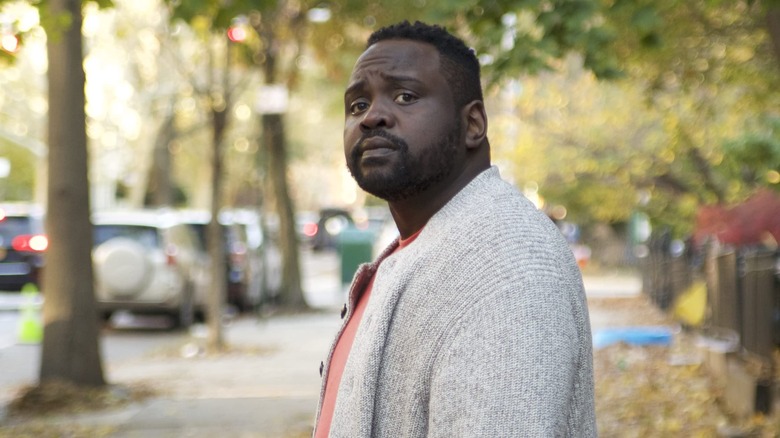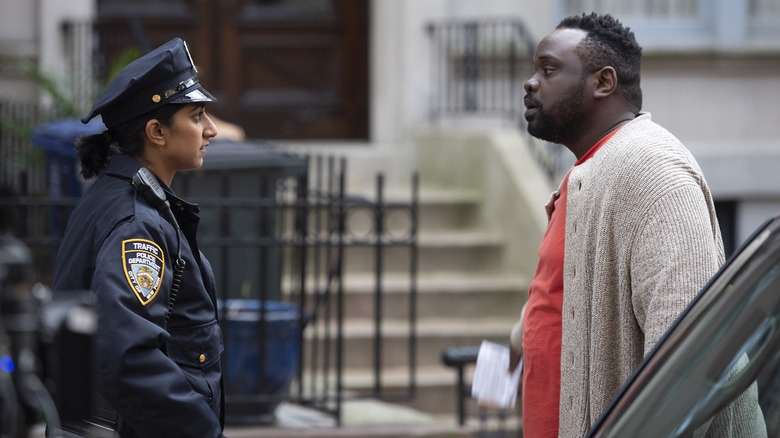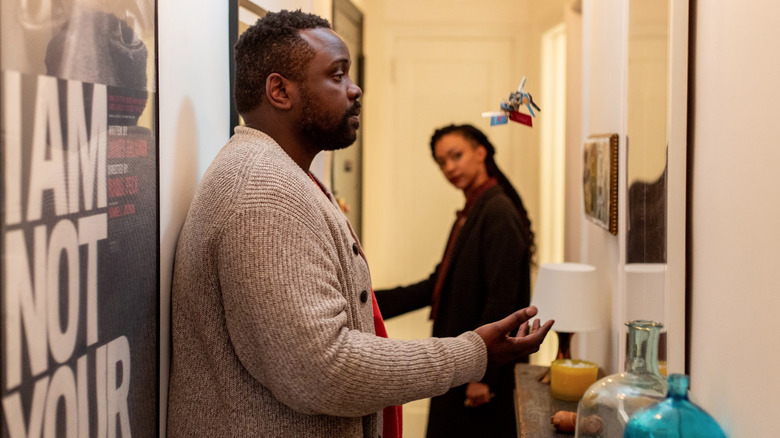The Outside Story Review: Undercut By The Pandemic
An independent film being released to the public over two years after finishing principal photography isn't an anomaly, but for "The Outside Story" — the new comedy starring Brian Tyree Henry — the delay couldn't have had a more profound impact on how the narrative will be received.
In 2020, the COVID-19 pandemic hit the movie industry hard, grinding both production and exhibition to a halt, as well as pushing back many already completed films. Some Hollywood projects, like Disney's "The Falcon and The Winter Soldier" series, had their planned themes inadvertently strengthened by being released to an audience whose daily life had been thrown into upheaval, a new status quo echoing the experiences of the MCU's principal characters. But writer/director Casimir Nozkowski conceived his feature debut from a personal event (accidentally locking himself out of an apartment) that he felt could be a relatable metaphor for grappling with how insular and antisocial our obsession with screens and digital living has made us.
So, what might've been a charming little tale about an inopportune day out of the house opening a man's eyes to the beauty of the world around him instead feels like a laughable predicament. After all, for a viewership largely composed of people who've been trapped inside their apartments for the better part of a year, the inherent shock of winding up stuck outdoors loses its dramatic luster. But that's not to say the film, as a whole, is a total loss.
'I'm on the outside. I'm looking in...'
After seeing him pop up in what feels like every single movie since his breakthrough in FX's "Atlanta," "The Outside Story" makes a strong starring vehicle for Brian Tyree Henry. In the film, he plays Charles, a failed documentarian turned freelance editor struggling with his recent break-up with Sylvia (Sonequa Martin-Green). His current gig has him holed up in his NYC apartment, prematurely crafting in memoriam tribute montages for a classic movie network. It's supposed to be a simple job, but like most things in Charles' life, his perfectionism makes it complicated.
Between putting the finishing touches on a new tribute for an ailing actor who could pass away any minute now and waiting for Sylvia to come move her remaining belongings out, Charles has a lot on his plate. But it gets significantly worse when a belabored interaction with a delivery driver leads him to locking himself out of his apartment with no shoes, no wallet, and a dying smartphone. From there, the narrative conjures a variety of semi-comedic barriers between Charles and the safe confines of his domicile. These range from touching (bonding with a lonely young girl hiding out from her abusive mother) to strange (repeatedly barging in on his upstairs neighbor who's trying to have a threesome with European tourists) to tiresome (ongoing interactions with an overbearing traffic cop played by Sunita Mani).
Some of the less funny bits can be forgiven for their logistic necessity, like the one friend Charles left a spare key with being the sort of person who stores unmarked keys in a giant, unorganized bag. But the film's curious choice to spend so much of its short 85-minute runtime with Charles, a Black man, having successive skirmishes with the police falls as flat as one might imagine in this climate. These scenes are supposedly to be played for laughs and even loosely hint at a burgeoning attraction between Charles and Slater, the parking ticket-obsessed cop, but they ultimately go nowhere.
Instead, what works the best are the moments that would've played so much better in a theoretical pre-COVID release. The longer he's stuck outside, the more Charles begins to open himself up, connecting with neighbors and passersby he would otherwise scarcely converse with at all. Henry, a versatile and empathic performer, does an incredible job selling this transformation. Watching a man who might be generously described as a curmudgeon use sidewalk chalk to mark a path so his pregnant neighbor will get more patrons at her yard sale before helping an elderly woman craft an online dating profile proves to be exactly the sort of low stakes on-screen charm that Henry is perfect at delivering.
But it takes so long to get to that point. Well, it feels like it does because the vast majority of audience members are so starved for sunlight and casual human interaction that they'll be utterly baffled at how it takes Charles so much time to remember how nice just taking in the scenery can be.
'I can see through you, see your true colors.'
Unsurprisingly, it's the sections of the film unpacking Charles and Sylvia's break-up that make "The Outside Story" feel the most vital, divorced as they are from the sitcom spectacle of his lockout predicament. It becomes easier to swallow the premise of Charles being trapped outside as the film further explores how his aversion to leaving his apartment not only predates the break-up but helped cause it.
Through a series of flashbacks, we see how Charles and Sylvia meet at a party when she finds solace in him after a night of having her current partner drag her from tiresome social outing to tiresome social outing. In that meet-cute moment, she's a woman who's had enough of that hollow hustle and bustle. So, within that context, Charles isn't a stuffy homebody whose obsessive nature has felled a more successful career producing documentaries. He's an oasis, a pleasant change of pace who promises to be a healthy alternative Sylvia could really get used to.
But in the initial flashbacks, it feels as though their relationship had an obvious expiration date from the start. The implication for the viewer — and how Charles sees things for himself — is that Sylvia only viewed him as a viable partner because she needed a break from partying. But once that break got old, she no longer needed someone like him around, a supposition unfortunately supported by the indiscretion that leads to their uncoupling.
"The Outside Story" isn't just about Charles being forced by happenstance to get outside of his apartment — and thus outside of his head — but to come to terms with a different truth. Sylvia wasn't drawn to Charles because he was wallflower but because in his own insular way, he had a genuine lust for life, even if he buried it under mountains of self-delusion. As the viewer sees more of this brighter, outgoing Charles adapting to life outside of his own four walls, so too do the flashbacks show this to be the man Sylvia first went home with, at the time unaware that he would devolve into someone who would do anything to avoid leaving home again.
Despite a somewhat goofy set-up and an inconsistent execution marred by the circumstances of its release and the inescapable reality that surrounds it, "The Outside Story" works best when it relies on the strength of its lead performance to paper over its inadequate script. But its true power lies in its ability to implore the viewer to look inward and get reacquainted with who they really were before they got stuck on the wrong side of their apartment door.


